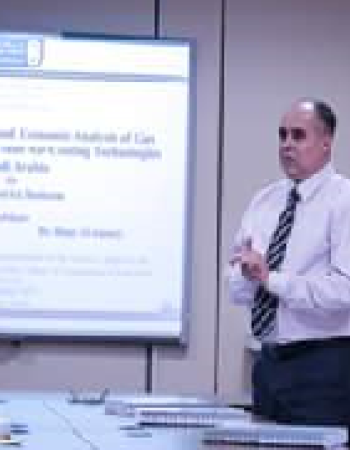Boiling Characteristics During Quenching of Metal Rods Under Pool and Flow Boiling Conditions, by Dr. Turki Almudhhi is an Assistant Professor of Mechanical Engineering at King Saud University.
Boiling Characteristics During Quenching of Metal Rods Under Pool and Flow Boiling Conditions
Abstract: Accurate prediction of post-critical heat flux (post-CHF) heat transfer and boiling characteristics is crucial for nuclear safety evaluations in hypothetical Loss of Coolant Accident (LOCA) scenarios. A key aspect of this study is the minimum film boiling temperature (Tmin), which serves as the threshold between the film boiling and transition boiling regimes. Tmin plays a vital role in determining boiling heat transfer within various thermal-hydraulic models used in nuclear safety evaluations.
Two sets of experiments were conducted: quenching under pool boiling conditions and reflood experiments under flow boiling conditions. Pool boiling experiments, using heated rods with embedded thermocouples in a liquid pool under atmospheric pressure, investigated the effects of initial surface temperature, liquid subcooling, and surface conditions on Tmin. Results showed that Tmin increases with liquid subcooling, while the initial surface temperature had little effect in the film boiling regime. A high-speed camera was used to capture the transient quenching process, allowing for the analysis of vapor film thickness and the behavior of the liquid-vapor interface during the film boiling regime. Reflood experiments using a 7×7 electrically heated rod bundle in the NRC-PSU Rod Bundle Heat Transfer (RBHT) facility were conducted, focusing on quenching temperature (Tq). Variables such as pressure, subcooling, and flooding rate were investigated. The results indicated faster quenching at higher pressures and subcooling. The effect of flooding rate on Tq depends on the elevation and flow rate. At low elevations, the quenching temperature (Tq) tends to increase with the flooding rate regardless of whether the flooding rate is high or low. At high elevations, the Tq behavior varies differently with the flooding rate.
Short Biography: Dr. Turki Almudhhi is an Assistant Professor of Mechanical Engineering at King Saud University. He earned his Master's and Ph.D. degrees in Mechanical Engineering from Pennsylvania State University, finishing in 2023. At Penn State, he focused on studying pool and flow.

College of engineering workshop series “3D Printing: From Principles to…

Boiling Characteristics During Quenching of Metal Rods Under Pool and Flow Boiling…

Renewable energy and energy efficiency measures to foster the energy transition and…

